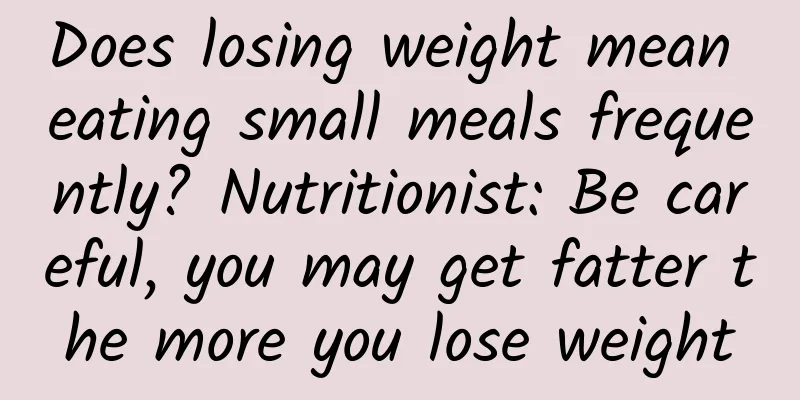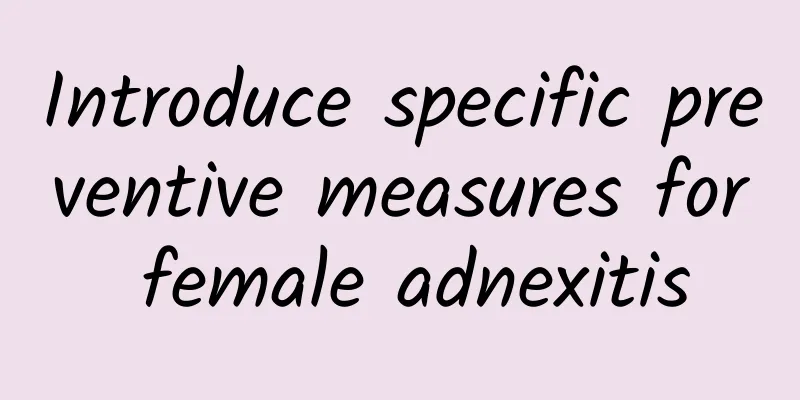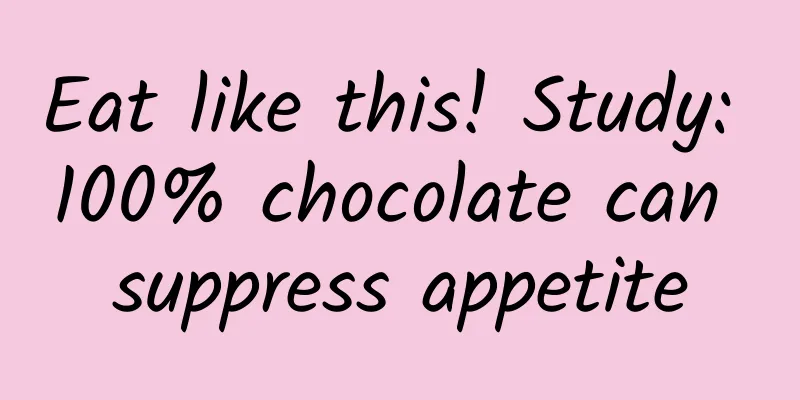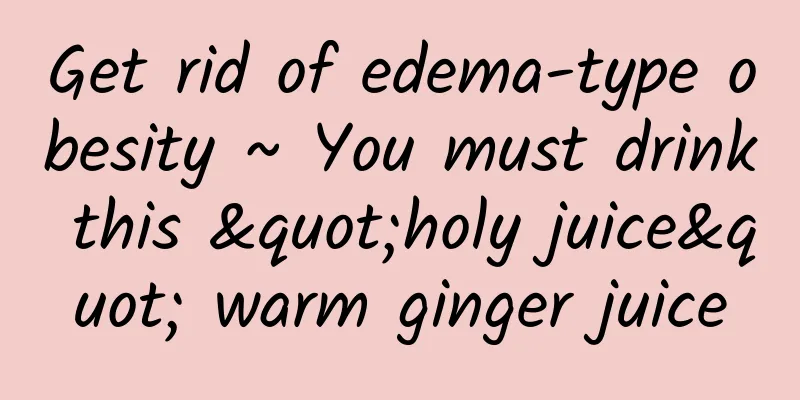Does losing weight mean eating small meals frequently? Nutritionist: Be careful, you may get fatter the more you lose weight

|
Every time we talk about weight loss, there is always a group of people who will advocate that you should eat small meals frequently to lose weight. The reasons are as follows: "Eating small meals frequently means dividing the calories you can consume in a day into five to six meals. This prevents the body from reducing metabolism due to hunger, and also avoids eating too much at one time, which causes excess calories and causes fat accumulation. Eating multiple times provides a higher sense of fullness. In addition, you can have a snack outside of the main meal, which will make you feel happier and more comfortable psychologically." In plain words, it means controlling appetite and food intake by eating small and frequent meals so as to achieve successful weight loss. This theory seems quite reasonable! I used to be a supporter of eating small meals frequently, and I have personally experienced this method of weight loss. At that time, I had plenty of time to prepare each meal, the calories were properly controlled, and the right foods were chosen. After doing this for a period of time, I could naturally see the results. How to implement small and frequent meals? What can I eat? Taking an adult woman who is 160cm tall, weighs about 50kg and has a slightly lower level of activity as an example, the calorie requirement for a day is 1650kcal. If she hopes to lose 2kg in a month, she must reduce 500 calories a day, which means she can only eat 1150 kcal a day. So let's just guess at 1200kcal! These 1200 kcal need to be divided into six meals, namely 300 kcal for breakfast, 400 kcal for lunch, 300 kcal for dinner, 100 kcal for early breakfast and 100 kcal for midday snack. What can you eat with this amount of calories? You can eat 1.5 bowls of whole grains and root vegetables, 3 servings of beans, fish, meat and eggs, 1.5 cups of low-fat dairy products, 3 plates of vegetables, 2 servings of fruit, 3 teaspoons of vegetable oil and 1 serving of nuts and seeds throughout the day. If you cook for yourself, there is generally no problem in distributing these foods among three meals. But it is not easy to apply it to people who eat out! A cheese bagel is 350 kcal, a tuna egg toast is 400 kcal, a latte is 150 kcal, a takeout lunch is 600~800 kcal, pasta is 450~550 kcal... It is not easy to control the calories in a day, and you have to cut it into small meals, which is quite difficult! In order to lower the calories of the meal, it is easy for the implementer to limit the food choices, and often end up filling their stomachs with simple, easily available foods, such as: a meat bun for breakfast, a bowl of porridge for lunch, a triangular rice ball for dinner, and some fruits, zero-calorie drinks, low-calorie snacks, etc. In the long run, such a diet may not only easily lead to nutrient deficiencies, reduced metabolism, and lack of sufficient dietary fiber leading to constipation, but it may also make you feel often hungry and fail to lose weight. Can “eating small meals frequently” really control appetite and help with weight loss? A study published in THE JOURNAL OF NUTRITION found that 12 healthy adults were divided into a group that ate three meals a day and a group that ate eight meals a day . They consumed the same amount of calories each day and were evaluated on their hunger, desire to eat, satiety, thirst, and nausea. It was found that there was no significant difference between the two groups, and the claim that eating small, frequent meals helps control appetite was not supported. Should we abandon the “small, frequent meals” weight loss method? The key to successful weight loss comes from adequate nutrition and proper calories. If the "regular and regular" diet for three meals a day is more in line with your lifestyle than "small and frequent meals", then you don't have to deliberately train yourself to have a small stomach and eat small and frequent meals, or choose low-calorie and non-satiating light meals. Instead, you should focus on choosing high-fiber whole grains, sufficient fruits and vegetables, high-quality beans, fish, meat, eggs, good fats and other foods with high nutritional value, and reduce refined starch, high-fat, high-salt foods with no nutritional value. If you want to know whether eating small and frequent meals is suitable for you, you might as well try to observe your physical and psychological feelings when doing it. If eating small and frequent meals makes you feel physically comfortable and you can find balanced and nutritious meals to eat, then of course you can do it for a long time. If eating small and frequent meals makes you feel troublesome, you don’t feel full, and you don’t have much time to eat, then "fixed time and fixed quantity" may be more suitable for you. Frankly speaking, I personally think that the concept of "small and frequent meals" (main meals + snacks) is quite effective in "maintaining" a healthy weight and is suitable for my body. I like to eat some fruit between meals or some nuts as a snack in the afternoon, which can not only satisfy hunger but also replenish nutrients. Of course, I don't have so much free time to eat these snacks between meals every day. Therefore, this diet method is flexible for me. For example, when I work in the office, I will prepare fruits as afternoon tea; when I go to exercise directly after get off work, I will divide the calories needed for dinner into two equal parts, eat a small meal first and then exercise, and then eat the main meal after exercise; if I am on a business trip or am busy, I will choose to eat three meals normally, eat until I am 70% full, and not eat between meals. In short, as the old saying goes, a diet that suits others may not be suitable for you, and vice versa. References Higher Eating Frequency Does Not Decrease Appetite in Healthy Adults, 2016 The content comes from the blog of nutritionist Sun Yuming, who loves to talk For more details, please see Nutritionist Loves to Talk - Sun Yuming Nutritionist Blog |
Recommend
How long does it take to get menstruation after uterine curettage? What is the reason for abnormal menstruation after uterine curettage?
The time of menstruation after curettage varies f...
What to eat if you have Bartholinitis
What should you pay attention to in your diet whe...
Wrong weight loss can hurt your body. There are tips for partial sculpting.
Recently, He Jiawen took diet pills indiscriminat...
Pelvic effusion authority hospital
As a patient, the level of hospital experts is on...
Do I need surgery for uterine cysts?
Whether a uterine cyst requires surgery depends o...
Are chocolate cysts contagious?
Are chocolate cysts contagious? Chocolate cysts a...
How to treat chronic cervicitis with squamous epithelial hyperplasia? 3 methods are the most effective in treating chronic cervicitis
Some diseases are chronic, and some are short-ter...
What are the hazards of uterine fluid accumulation in women
Uterine effusion is an uncommon disease, also kno...
Primary dysmenorrhea may be accompanied by low back pain or radiate to the medial thigh
Sometimes primary dysmenorrhea is crampy and some...
What should you pay attention to in your diet after cervical precancerous lesions surgery?
We all know that cervical precancerous lesions ar...
What are the specific methods to prevent threatened abortion?
Many people do not know the specific prevention m...
Eat with peace of mind! Department of Health PaPaGo holds briefing
In view of the recent hot topics on health and sa...
What are the two points that can be summarized as the causes of cervical hypertrophy?
Female patients will only find out the cause of c...
Special manifestations of early symptoms of ovarian cysts
We must understand the symptoms of ovarian cysts ...
I would like to ask the experts how to deal with cervical erosion and bleeding?
How to deal with cervical erosion bleeding is wha...









